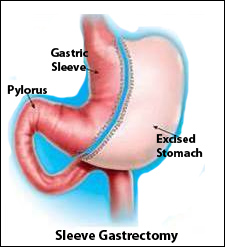Sleeve gastrectomy is the most frequently performed bariatric surgery at Newton-Wellesley Hospital’s Center for Weight Loss Surgery. Sleeve gastrectomy, also known as gastric sleeve surgery, provides a low level of risk and good weight loss outcomes. Our bariatric surgeons perform hundreds of procedures each year for patients from Greater Boston communities and all over New England.
Gastric Sleeve Surgery in Greater Boston
According to the American Society for Metabolic and Bariatric Surgery and the National Institutes of Health, gastric sleeve surgery is the current gold standard procedure for weight loss surgery. It is one of the most frequently performed weight loss procedures in the United States. It is both a restrictive (decreasing food intake by reducing the size of your stomach) as well as a metabolic (altering chemicals in your blood to change your perception of hunger and fullness) bariatric surgery procedure. Originally the first stage of a two-part treatment, it has been found to be safe and effective as a standalone weight loss surgery.
 How Gastric Sleeve Surgery Works
How Gastric Sleeve Surgery Works
During this procedure, the surgeon creates a small, sleeve-shaped stomach, about the size of a banana. Approximately 85 percent of your stomach is removed, leaving the sleeve-shaped stomach.
Gastric sleeve surgery has become one of the major weight loss interventions throughout the world, and in the U.S., private insurers are covering this medically necessary procedure. Studies continue to support laparoscopic sleeve gastrectomy as a viable and safe surgical option for long-term weight management if you are morbidly obese.
Advantages
- While the size of your stomach is reduced and you must minimize the amount of food you eat, your stomach still functions normally.
- You are less susceptible to the complications that can result from intestinal bypass, such as protein and vitamin deficiencies, intestinal obstruction, anemia, and osteoporosis.
- The majority of the area in your stomach that produces Ghrelin, a hormone that stimulates hunger, is removed.
- There is less risk for ulcers and “dumping syndrome” (when your body reacts to ingesting foods high in fat and sugar causing a spectrum of symptoms from pain, fatigue, nausea and vomiting to intestinal cramping and diarrhea).
- High-risk patients with anemia, Crohn’s disease, and other conditions affected by intestinal bypass may be able to have this surgery.
- Sleeve gastrectomy can safely be performed laparoscopically in any weight patient.
- Type 2 diabetes goes into remission for 50%-65% of patients.
Risks
- Weight gain can occur in the long term as with any weight loss surgery.
- Stomach-stapling complications such as leakage can occur.
- The procedure is not reversible.
- Post-operative bleeding, pneumonia, gastric reflux, abdominal wall hernia can occur.
If you have a very high BMI (>50), you can undergo sleeve gastrectomy safely but may require follow-up weight loss surgery to achieve your goal (see SIPS- duodenal switch procedure).
Call us at 617-243-3724 to request an appointment